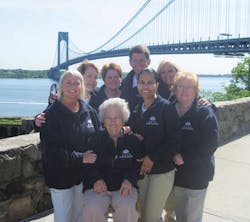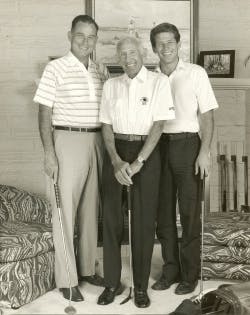By Victor P. Avis, DDS
Philosophical principles bridge gap between family's three generations of dentistry
When I think back to my childhood, I have vivid memories of my dad reading Dental Economics® on Sunday evenings as he prepared mentally to begin his week. So, when I was asked to write an article about our current practice, I was honored and a bit awed. I called DE Editor Dr. Joe Blaes and asked what he would like me to write about. Dr. Blaes responded, "Share with our readers your story … What is the secret of your success?...What is your philosophy?" With great humility, and a hope that it might help others, I share my story and some philosophy.
Our story begins in 1918. My grandfather, Harry Avis, was one of 12 children in a poor Bronx family. He sent a friend to Manhattan to sign the two of them up for medical school. In those days, it was not uncommon to walk such long distances. Public transportation was relatively undeveloped. But the friend became tired walking mile after mile. So instead, he enrolled them in the much closer New York College of Dentistry. So began the saga of three generations of the Avis family in dentistry.
Harry opened the Avis practice in 1922 on St. Paul's Avenue in Staten Island, N.Y., about 300 yards from our current location. Dentistry was quite different in those days. A single filling could require three visits, anesthesia was fairly crude and unreliable, and antibiotics simply did not exist – an abscess was a potentially life-threatening condition. Harry spent much of his career extracting teeth and placing dentures. There were also many differences in the way a dental practice operated. For instance, Harry had only one appointment time: 9 a.m. It was first come, first served.
In 1951, my father, Ron, graduated from NYU's dental school, and after two years in the Navy, he joined his father in practice. Anxious for change, Ron gradually gained traction for his ideas. Harry allowed a second appointment time in the schedule, 1 p.m. Ultimately, Ron evolved the practice further toward his vision: visits by appointment, a new office building (across the street), and new technology. This included high-speed drills, implants, and comprehensive restorative procedures intended to save teeth.
Philosophical Belief No. 1: Treat your patients with honesty, integrity, empathy, and your very best skill. Your rewards will be great.
In 1987, I joined my father, and for the next 12 years I was blessed with a most talented and generous mentor. My dad said from the beginning, "Son, if you see dentistry that I did that is not okay, do not worry about my feelings. Put the welfare of the patient first and foremost and correct things as indicated." I appreciated this statement then but admire it even more today. Through his words and actions, my father modeled the principle: Treat your patients with honesty, integrity, empathy, and your very best skill. Your rewards will be great.
Interestingly, when I joined the practice in 1987, my father had already brought in and developed two partners. By 1990, there were six dentists and more than 40 staff. At the time, we participated in capitation insurance plans, PPOs, reduced-fee insurance plans, accepted assignment of benefits, and gladly billed balance after insurance benefits were received.
A neophyte at the time, I did not question most of these management decisions; however, I vividly remember being frustrated and asking my father why patients were consistently expressing their interest in my recommended treatment by responding, "Is it covered by my insurance?" To which the answer was often "no," or "partially."
The likelihood of my providing these patients appropriate care, I thought, went out the door with the patient. The patients unknowingly had been conditioned to let the insurance companies dictate their care. I, as their doctor, was getting discouraged making the effort to diagnose and discuss their treatment options, only to be disregarded with "give me what my insurance covers."
I understood at an early stage in my career how doctors could just assume that since a patient has such and such an insurance, this is the care he or she will accept. My value system could not allow this. So I chose a different response. During the next year, I gave a classmate all of our capitation contracts. This was just the beginning of sweeping, broad change.
I listened to an old cassette (yes, cassette) series of my dad's, produced by Avrom King. King convincingly stated that all change is, at first, philosophic in nature. Inspired, I insisted on and led a two-day practice retreat with the staff. Expressing what I thought was a compelling vision for our practice, I was a little surprised and disappointed that only a few of the staff shared my interest in the vision. But my passion for creating a practice that modeled excellence was great, and I was not to be dissuaded.
During the next few years, my father supported me as we dissolved all partnerships, reduced the staff to fewer than 10, and changed our relationships with insurance companies. We no longer would allow insurances to dictate treatment or get between the patient and the doctor. To this day, our team facilitates patients optimizing their entitled benefits; however, our patients accept and are responsible for their dental investment.
Philosophical Belief No. 2: My staff is my most important investment and most valuable asset.
As a child, I watched how my father valued and treated his staff exceedingly well. I did not think much about it then, but I now realize it was a key to his practice success. Some doctors may look at staff as their greatest expense or even the source of their most significant frustration. I believe my staff is my most important investment and most valuable asset. Each day there are multiple moments of truth with respect to providing excellent service. Most of these moments are out of the purview or control of the dentist or office manager. I realized that developing a great team was essential to realizing my vision.
A fun and memorable exercise to help my team gain clarity about my vision was recommended to me by Chris Sager and Irwin Becker of the Pankey Institute. During a four-week period, our team enjoyed lunch together at four different types of restaurants: McDonald's, a diner, a restaurant with white tablecloths, and the Ritz Carlton.
At our last stop, the Ritz, we participated in a half day of customer service training and then enjoyed an elegant five-course lunch (no work this day!). At each of the meals, we discussed our expectations, the level of customer service, the expense, and the distinctions. I wanted my team to be clear about what our distinction was, what type of service we wanted to provide, and who we wanted to be.
We agreed that our level of dental service would be analogous to the Ritz Carlton in the hotel industry. After developing clarity about our vision, we conducted an exhaustive process of codeveloping our practice mission statement. This was invaluable. We became clear about our core practice values, values about which we would not compromise, and values to which we agreed to hold one another accountable.
In this process, staff members whose values were not aligned became exposed. In time, these staffers selected themselves off of the team. As I developed my new team, my practice coach, Allen Tappe, challenged me with two thoughts: "All negative people must go," and "Each new team member changes the team and should make the team better." It has taken me awhile to learn these lessons.
Because I have been vested in developing a great team and been blessed with good fortune, the Avis staff is formidable and empowered professionally. The team shares core values and a passion for our mission, practices accountability, feels ownership and pride, has fun, and truly enjoys one another.
Philosophical Belief No. 3: Education with execution will provide a significant practice distinction.
Throughout this article, I have purposefully given credit to mentors along my journey. Their teaching, dedication, and influence have profoundly impacted my career. My dad would say, "A dental degree is a license to learn." With this, he encouraged me to seek postdoctoral education. From the beginning, I sought leading teachers and traveled to their offices, institutes, or centers to learn. More importantly, I consistently applied what I had learned.
I would return home with three tasks: 1) share with my team what I had learned and how it would benefit our patients; 2) order the list of materials and technology necessary to implement the new techniques and concepts; and 3) develop a strategy, with my team, to put into practice what we learned. Remember, learning without implementation is merely entertainment, or as Allen Tappe would say, "Intention without execution creates depression." I can remember Dr. Peter Dawson and the Pankey Institute's estimate that only 10% of their students truly implemented what they had been taught. Taking action to apply what you learn is the difference maker!
In addition, I looked for opportunities to bring staff along or send staff to educational seminars. I believe educational development is essential to their professional mastery, elevation of their professional self-esteem, and providing our patients with excellence. In addition, these trips and experiences revitalize our team. Team educational development improves performance, enhances relationships, and promotes accountability. It means the difference between forcing change and bringing about change together.
My extraordinary laboratory technician, Paul Federico, has been a part of 90% of these educational sojourns. From pretreatment planning to final restorations, we are not only on the same page but we hold one another accountable to the highest standards of what we have learned together.
Finally, education has allowed me to expand the services that I offer to patients. Long ago, my father suggested to me that once patients develop a faith and trust in you, they do not want to be referred elsewhere. I have found this to be true. As long as a general dentist can provide care to the standards (or beyond) of the specialist, that doctor can provide patient care unparallelled for convenience, continuity, and accountability. But this ability to provide comprehensive expanded services can only be accomplished when an intensely strong commitment to postdoctoral education is coupled with desire.
Education continues to be an ongoing process. I suggest that you ask those doctors you respect which educators they consider as outstanding. Also, I recommend involvement in study clubs. You should be particular. Look to "soar with eagles." Through the years, I have enjoyed significant professional growth from active paxsrticipation with our Dawson/Triad Focus Group, the NJRV Tucker Cast Gold Study Club, the NJ Gold Foil Study Club, and more recently, the Kois Tristate Mentor Alliance.
Each of these groups has exposed me to peer relationships, mentors, speakers, and educational opportunities that have proven invaluable. From the Dawson group came a relationship with Allen Tappe. I cannot recommend strongly enough that doctors invest in an excellent coaching/consultative relationship.
We call our brand of dentistry the Avis Alternative. We believe the representation of our philosophy offers patients a distinctive alternative for dental care. The Avis Alternative means our team strives to treat people as we believe they would like to be treated. We provide patients an opportunity for wellness as an alternative to more popular reparative models. Finally, we believe a general dentist can provide almost all services in dentistry…comprehensive care that is convenient and without compromise.
I am fortunate to care for many appreciative people. In response to a reporter's question about a lucky break during a tournament, golf great Jack Nicklaus said, "The harder I work, the luckier I get." Work hard in the correct direction and good luck will follow. Find your passion in dentistry.
To see more about the office, our philosophy, or how it is represented, visit our Web site at avisdds.com.
Avis Dentistry Mission Statement
We are a professional dental team dedicated to helping our patients achieve and maintain their optimal dental health. Always striving to exceed our patients' expectations, we will treat them with honesty, care, and respect. The Avis staff is committed to continuing education and excellence. In this pursuit, we are unwilling to compromise our values. Through the sharing of this mission, we will enhance the lives of our patients.
For more on this topic, go to www.dentaleconomics.com and search using the following key words: Avis Dentistry, philosophical beliefs, family, generation span, Dr. Victor Avis.








